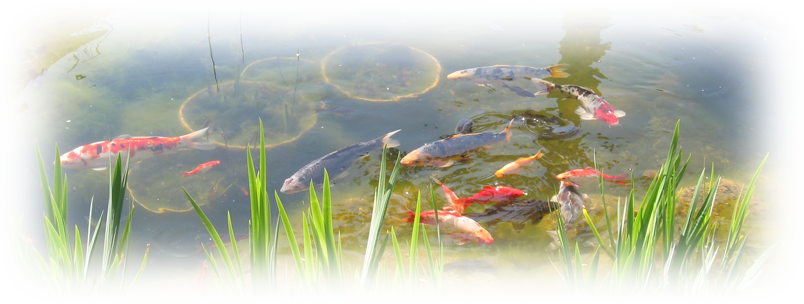More
Articles of Interest
judge is looking for.
Kawarigoi by Dick "coach" Benbow
Kawarigoi, that "class" of fish that doesn't fit into the approximately twelve other classes. Read More Koi and Goldfish Food - Everything You Ever Wanted to Know But Were Afraid to Ask by Diana Lynn RehnFish get nutrition from three sources: food, water and sunlight. They take in nutrition through their intestines and gills. Water temperature is the number one factor that affects feeding and growth rates in fish. Read More Inland Northwest Pond Predators by Gayla AspenleiterHaving a pond in your yard can be enjoyable and relaxing. Ponds help relieve stress from our busy lives. But ponds also attract predators so make sure you prepare for their visits. The three most prevalent predators to visit ponds in the Inland Northwest are blue herons, osprey and raccoons. Read More
Asagi by Dick "coach" Benbow
The first color variety established in the continuing lineage of Koi started with Asagi. Read More Salt Use in Ponds by Carolyn Weiss Salt is used as a parasite prevention and treatment, primarily spring and fall, or if symptoms are noticed during the summer months. Read More-
Foam Fractionators by
John Seifert
Foam Fractionators
Do you have bubbles on your water surface? Do you have algae problems, either floating or string? Do you have water clarity or quality problems? If the answer is yes, you may very well benefit from installing a foam fractionator (FF). Read More
Bekko by Dick "coach" Benbow Bekko (bek-koh) may be the Rodney Dangerfield of the Koi World...not much respect. In fact many clubs have downgraded the classification into the catch all class because it seems few are entered in shows. Read More Snails by Carolyn Weiss Inviting snails into your pond can be something you will live to regret. Snails are voracious plant-eating machines. Read More
- Lily or Lotus by Gayla
Aspenleiter
As a novice water gardener, I believed that lilies and lotuses were one in the same. NOT! And apparently, I am not alone. Read More
Sanke Selection by Dick
"coach" Benbow
Sanke is one of the
hardest color variety to
breed to get a good
representative. It's
given variety name is
Taisho Sanshoku, which
in Japanese explains the
variety was "made"
during the taisho period
of the emperor and that
as sanshoku, it is a
three colored koi.
Read More - Fish Handling by Carolyn
Weise
There are a few basics to knowwhen picking up a fish for examination or moving them from a tank to the pond. Read More - Interesting Tidbits:
-
Goldfish
Did you know that goldfish get constipated? Well, they do. Constipation is typically revealed by bloating and the production of stringy feces hanging from the fish. Fish will be lethargic and disinterested in food. Severe constipation can cause your fish to swim abnormally, like upside-down. Constipation is caused by a diet lacking in dietary fiber. Yes, fish need fiber too! Tinned peas are a great solution for goldfish. Frozen Pond?
Now what do you do? Don’t panic! The first thing you need to do is get a hole open in the ice. And NO, don’t run for the hammer, axe or other instrument as this will send shock waves through the pond that will stress your fish. Pouring warm/hot water is one option to create a hole and another is to use a drill (paddle bit) to make a small hole. The goal is to vent the pond of harmful gases that could really harm your fish.
